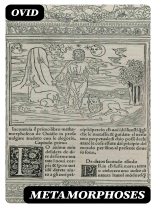Ovid’s ‘Metamorphoses’ is a groundbreaking narrative poem that intricately weaves together over two hundred myths, exploring the themes of transformation and the fluidity of identity. Composed in dactylic hexameter, this epic work showcases Ovid’s masterful command of language and his innovative approach to storytelling. The poem not only captures the imagination with its vivid imagery and inventive tales of gods, mortals, and mythical creatures, but it also serves as a reflection on the transitory nature of existence and the interplay between fate and free will, deeply rooted in the literary context of Augustan Rome, where themes of change and renewal were particularly resonant. Ovid, born in 43 BCE in Sulmo, was a revolutionary poet whose experiences in a politically charged society heavily influenced his work. Renowned for his previous poetic composition, ‘Amores, ‘ Ovid’s exile in 8 CE for reasons still debated provides a poignant backdrop for ‘Metamorphoses.’ This sense of loss and transformation permeates his writing, as he skillfully embodies the complexities of human emotions and relationships, thereby crafting a lasting legacy in Western literature. Highly recommended for readers interested in mythology, poetry, or the intersection of art and philosophy, ‘Metamorphoses’ is more than just a collection of stories; it invites introspection on the nature of change within ourselves and our world. Its enduring relevance speaks to the human condition, making it essential reading for both scholars and casual readers alike.
Sobre el autor
Publius Ovidius Naso, commonly known as Ovid, was a classical Roman poet who thrived during the reign of Augustus and the early years of Tiberius’s reign. Born on March 20, 43 B.C.E. in Sulmo, now Sulmona, he was best known for his captivating work ‘Metamorphoses’ (circa 8 C.E.), a powerful collection of mythological and legendary transformations rendered in hexameter verse. This literary masterpiece synthesizes the Roman and Hellenistic traditions of mythography, spanning from creation to Julius Caesar’s apotheosis, illustrating over 250 tales of metamorphosis with dexterity and imaginative brilliance. Ovid’s writings not only provide insight into ancient myth and lore but also reflect his own artistic milieu and the psychological landscape of his characters. A versatile poet, Ovid’s oeuvre includes other significant works such as ‘Amores’, ‘Ars Amatoria’, and ‘Fasti’, though ‘Metamorphoses’ remains the most emblematic of his profound influence on Western art and literature. His elegant and sophisticated style, characterized by wit, rhetorical refinement, and an inventive use of the elegiac couplet, has earned him a place among the canonical poets of Latin literature. Ovid’s later life was marred by his inexplicable exile to Tomis by Emperor Augustus in 8 A.D., a poignant subject he explored in ‘Tristia’ and ‘Epistulae ex Ponto’. Despite his physical isolation, Ovid’s literary legacy continued to metamorphose, inspiring works of countless poets, playwrights, and artists through the ages.












